Scientists develop antiviral material made from sugar
Published : 30 Jan 2020, 01:21
Scientists in Manchester in Britain revealed on Wednesday that they had developed new antiviral materials made from sugar that could be effective against diseases, such as the coronavirus.
The new antiviral materials destroy viruses on contact and may help in the fight against viral outbreaks, said the University of Manchester.
This new development from a collaborative team of international scientists shows promise for the treatment of herpes simplex (cold sore virus), respiratory syncytial virus, hepatitis C, human immunodeficiency virus (HIV) and Zika virus, to name a few. The team has demonstrated success in treating a range of viruses in the lab -- including respiratory infections or genital herpes.
"Although at a very early stage of development, the broad spectrum activity of this new approach could also be effective against newly prevalent viral diseases, such as the recent coronavirus outbreak," said a statement released by the University of Manchester.
The research is a result of collaboration between scientists from the University of Manchester, the University of Geneva (UNIGE) and the Swiss Federal Institute of Technology (EPFL) in Lausanne.
Publishing their work in the journal Science Advances, the team showed that they successfully engineered new modified molecules using natural glucose derivatives known as cyclodextrins. The molecules attract viruses before breaking them down on contact, destroying the virus and fighting the infection.
Dr. Samuel Jones from The University of Manchester and a member of the Henry Royce Institute for Advanced Materials jointly led the pioneering research with Dr. Valeria Cagno from the University of Geneva.
"We have successfully engineered a new molecule, which is a modified sugar that shows broad-spectrum antiviral properties. The antiviral mechanism is virucidal, meaning that viruses struggle to develop resistance. As this is a new type of antiviral and one of the first to ever show broad-spectrum efficacy, it has potential to be a game changer in treating viral infections," Jones said.
This new approach has also been shown to defend against drug resistance.
The scientists said the molecule is patented and a spin-out company is being set up to continue pushing this new antiviral towards real-world use. With further testing, the treatment could find a use in creams, ointments and nasal sprays or other similar treatments for viral infections. This new material can work to break down multiple viruses making for cost-effective new treatments even for resistant viruses.
So-called virucidal substances, such as bleach, are typically capable of destroying viruses on contact but are extremely toxic to humans and cannot therefore be taken or applied to the human body without causing severe harm. Developing virucides from sugar has allowed for the advent of a new type of antiviral drug, which destroys viruses yet is non-toxic to humans.
Current antiviral drugs work by inhibiting virus growth, but they are not always reliable as viruses can mutate and become resistant to these treatments.


